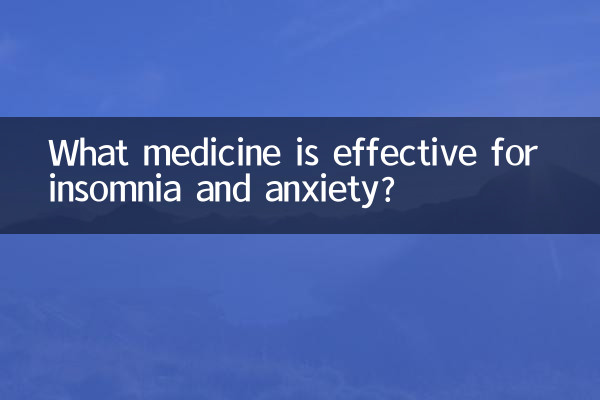What medicine is effective for insomnia and anxiety?
Insomnia and anxiety are common health problems among modern people, which seriously affect the quality of life and work efficiency. In response to this problem, many patients hope to relieve symptoms through drug treatment. This article will combine the hot topics and hot content on the Internet in the past 10 days to give you a detailed introduction to drug treatment options for insomnia and anxiety, and provide structured data for reference.
1. Common drug classifications for insomnia and anxiety disorders

Medication treatments for insomnia and anxiety are mainly divided into the following categories:
| drug class | Representative medicine | Mechanism of action | Applicable people |
|---|---|---|---|
| Benzodiazepines | diazepam, alprazolam | Enhance GABA neurotransmitter effects | Short-term insomnia, acute anxiety |
| Non-benzodiazepines | Zolpidem, eszopiclone | Selectively acts on GABA receptors | Difficulty falling asleep insomnia |
| antidepressants | trazodone, mirtazapine | Regulate the 5-HT system | Long-term insomnia accompanied by depression |
| melatonin receptor agonist | Ramelteon | Mimics the effects of natural melatonin | circadian rhythm disorder |
| natural ingredients | Valerian extract | mild sedation | Mild to moderate insomnia |
2. Drug Selection Guide for Different Symptoms
It is very important to choose the appropriate drug according to the characteristics of the symptoms:
| Main symptoms | drug of choice | alternative | Treatment recommendations |
|---|---|---|---|
| Difficulty falling asleep | Zolpidem | Ramelteon | 2-4 weeks |
| Difficulty maintaining sleep | Eszopiclone | Mirtazapine | 4-6 weeks |
| Anxiety with insomnia | alprazolam | Trazodone | 1-2 weeks |
| Depression with insomnia | Paroxetine | doxepin | More than 6 months |
| Insomnia in the elderly | Ramelteon | low dose trazodone | Individualized adjustment |
3. Precautions for drug treatment
1.Medication time: Hypnotic drugs should be taken 30 minutes before bedtime, and anti-anxiety drugs can be taken as needed or regularly.
2.Dosage adjustment: Start with the minimum effective dose and gradually adjust based on efficacy and tolerability.
3.adverse reactions: Common side effects include dizziness, drowsiness, dry mouth, etc. Severe cases require prompt medical treatment.
4.Dependence risk: Benzodiazepines should be used continuously for no more than 4 weeks to avoid the formation of dependence.
5.How to stop medication: After long-term use, the dosage should be gradually reduced. Sudden withdrawal may cause withdrawal symptoms.
4. Non-pharmacological treatment suggestions
In addition to medication, the following methods can also help improve insomnia and anxiety:
| method category | Specific measures | Effect evaluation |
|---|---|---|
| cognitive behavioral therapy | Sleep restriction, stimulus control | Best long term results |
| lifestyle adjustments | Regular work and rest, moderate exercise | Basic treatment methods |
| relaxation training | Deep breathing, progressive muscle relaxation | Relieve anxiety symptoms |
| diet regulation | Avoid caffeine, alcohol | auxiliary therapeutic effect |
5. Latest research progress
According to recent research published in medical journals:
1. New orexin receptor antagonists (such as suvorexan) are excellent at maintaining sleep structure.
2. Low doses of cyproheptadine have shown good effects on certain types of insomnia.
3. The combination of acupuncture and drug treatment is being verified in multiple clinical centers.
6. Expert advice
Sleep medicine experts remind:
1. The treatment of insomnia and anxiety should be individualized and a plan needs to be formulated after evaluation by a professional doctor.
2. Drug selection should take into account the patient’s age, underlying diseases, and drug interactions.
3. For special groups such as teenagers and pregnant women, special caution is required when using medication.
4. Regular follow-up visits to evaluate efficacy and adverse reactions are very important.
Conclusion:
Medication treatment for insomnia and anxiety requires scientific selection and rational use. The structured data and treatment suggestions provided in this article are for reference only. Please be sure to consult a professional physician for specific medication. Remember, medication is only one part of comprehensive management; a healthy lifestyle and psychological adjustment are equally important.

check the details

check the details